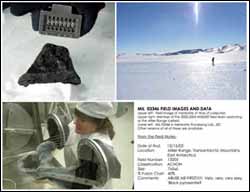New martian meteorite found in Antarctica

Far left: Field image of meteorite at time of collection Far right: Member of the 2003-2004 ANSMET collection team searching at the Miller range Icefield Bottom left: MIL 03346 in Meteorite Processing Lab, JSC <br>
While rovers and orbiting spacecraft scour Mars searching for clues to its past, researchers have uncovered another piece of the red planet in the most inhospitable place on Earth — Antarctica.
The new specimen was found by a field party from the U.S. Antarctic Search for Meteorites program (ANSMET) on Dec. 15, 2003, on an ice field in the Miller Range of the Transantarctic Mountains, roughly 750 kilometers from the South Pole. This 715.2-gram black rock, officially designated MIL 03346, was one of 1,358 meteorites collected by ANSMET during the 2003-2004 austral summer.
Discovery of this meteorite occurred during the second full field season of a cooperative effort funded by the National Aeronautics and Space Administration (NASA) and supported by the National Science Foundation (NSF) to enhance recovery of rare meteorite types in Antarctica in the hopes of finding new Martian samples.
Scientists at the Smithsonian Institution’s National Museum of Natural History involved in classification of Antarctic finds said the mineralogy, texture and the oxidized nature of the rock are unmistakably Martian. The new specimen is the seventh recognized member of a group of Martian meteorites called the nakhlites, named after the first known specimen that fell in Nakhla, Egypt, in 1911.
Like the other Martian meteorites, MIL 03346 is a piece of the red planet that can be studied in detail in the laboratory, providing a critical “reality check” for use in interpreting the wealth of images and data being returned by the spacecraft currently exploring Mars. Following the existing protocols of the U.S. Antarctic meteorite program, scientists from around the world will be invited to request samples of the new specimen for their own detailed research.
Nakhlites are significant among the known Martian meteorites for several reasons. Thought to have originated within thick lava flows that crystallized on Mars approximately 1.3 billion years ago, and sent to Earth by a meteorite impact about 11 million years ago, the nakhlites are among the older known Martian meteorites. As a result they bear witness to significant segments of the volcanic and environmental history of Mars.
The U.S. Antarctic Meteorite program is a cooperative effort jointly supported by NSF, NASA and the Smithsonian Institution. Antarctic field work is supported by grants from NASA and NSF to Case Western Reserve University; initial examination and curation of recovered Antarctic meteorites is supported by NASA at the Astromaterials Curation facilities at the Johnson Space Center in Houston, Texas; and initial characterization and long term curation of Antarctic meteorite samples is supported by NASA and the Smithsonian Institution at the National Museum of Natural History in Washington, D.C.
Media Contact
More Information:
http://www.case.eduAll latest news from the category: Earth Sciences
Earth Sciences (also referred to as Geosciences), which deals with basic issues surrounding our planet, plays a vital role in the area of energy and raw materials supply.
Earth Sciences comprises subjects such as geology, geography, geological informatics, paleontology, mineralogy, petrography, crystallography, geophysics, geodesy, glaciology, cartography, photogrammetry, meteorology and seismology, early-warning systems, earthquake research and polar research.
Newest articles

Parallel Paths: Understanding Malaria Resistance in Chimpanzees and Humans
The closest relatives of humans adapt genetically to habitats and infections Survival of the Fittest: Genetic Adaptations Uncovered in Chimpanzees Görlitz, 10.01.2025. Chimpanzees have genetic adaptations that help them survive…

You are What You Eat—Stanford Study Links Fiber to Anti-Cancer Gene Modulation
The Fiber Gap: A Growing Concern in American Diets Fiber is well known to be an important part of a healthy diet, yet less than 10% of Americans eat the minimum recommended…

Trust Your Gut—RNA-Protein Discovery for Better Immunity
HIRI researchers uncover control mechanisms of polysaccharide utilization in Bacteroides thetaiotaomicron. Researchers at the Helmholtz Institute for RNA-based Infection Research (HIRI) and the Julius-Maximilians-Universität (JMU) in Würzburg have identified a…



